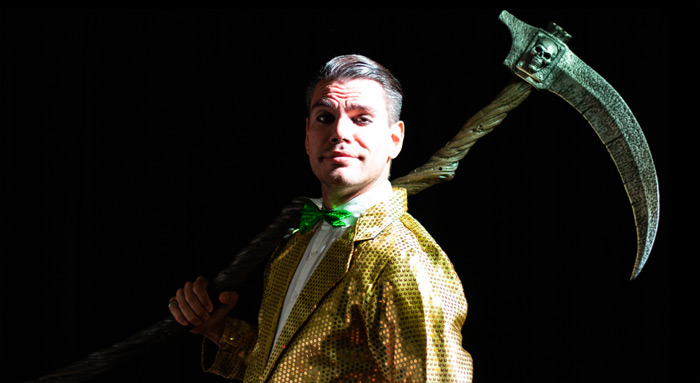By Skitzoid Productions
The Casa, Hope Street
26th October 2018
Reviewed by Mostyn Jones
You may not know the name Jackie Doyle-Price, but you should. She’s neither crew nor cast member in Skitzoid Productions’ fabulous black comedy Game Over, but her presence looms over the production. I went to see the play two weeks after Doyle-Price was announced as the UK’s, and indeed the worlds’, first minister for suicide prevention.
There was an attempt by the government to spin this appointment as something the country should be proud of, a sign of their compassion and concern over the fact that suicide is the leading cause of death for British men under 45, and rose 67% among teenagers between 2010 and 2017.
When in fact it should be obvious that this rise has been a consequence of the same government’s consistent cuts to mental health and social services. In this climate, playwright Dave Bain’s decision to write and direct a suicide comedy feels both risky and necessary.
The play occupies a niche between Jean-Paul Satre and Beetlejuice; the setting is limbo an ethereal gameshow where the casualties of suicide compete for the right to pass to the other side under the watch of Sam Dunning’s charismatic Dale-Wintonesque grim reaper.
The jokes consistently got laughs from the audience and the script seamlessly slips back and forth between the comic and tragic, as the two lost souls, played by Harry Boyd and Alex Harland, are made to confront the effects of their actions.
In the style of a variety show, the play features musical interludes as Death forces his contestants, marionette style, to sing original songs revealing their inner thoughts, while performing choreography by cast-member Elloise Jones. Jones plays one of the gameshow’s three judges, alongside Andrew Cunningham and Zeina Bain; though Jones’s judge of love is perhaps the only of the three who registers as a full character in the play, which mainly belongs to the three leads.
The entire production ran seamlessly from the minute I entered the room, where I was handed a programme which featured obituaries, extracts from character’s diaries, and a quiz in which I was invited to see how lost my soul is.
There was other audience interaction of the kind you might expect in a quiz show, and it all added to the jovial atmosphere, making the play both engaging and entertaining.
Also on hand was material from the Samaritans and other mental health groups, including the Liverpool Mental Health Consortium, who received all of the profits from the night’s production.
Though this was the productions last performance of the current tour, we have to hope it doesn’t stay dead forever. It’s an important and socially responsible production that confronts an issue that is too often shied away from.
